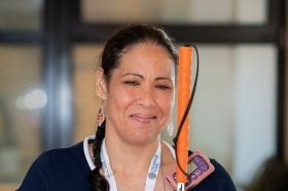
Wanda Díaz Merced is from Gurabo, Puerto Rico, where she completed her elementary, middle, and high school education. She earned a PhD from the University of Glasgow in Scotland, writing a thesis on the use of audio to analyze astrophysical plasmas. Wanda's work involves using sound to study various astrophysics, astroparticles, and gravitational wave phenomena. Wanda is the executive director of the NSF site for the historic district of the Arecibo Observatory.
She has collaborated with prestigious institutions such as the University of Paris, Katholieke Universiteit Leuven, University of Athens, Polish Academy of Sciences, Cosmic Ray Extremely Distributed Observatory in Poland, and the European Gravitational Observatory. Wanda also works with the Royal Academy of Science International Trust's Science in Braille program, coordinating the magazine DISC for Diversity, Inclusion, Science, and Culture. A strong advocate for inclusion, Wanda designed and has been teaching the first multisensory mainstream astrophysics and cosmology university course for students with disabilities for three years. Her course welcomes students with no prior academic preparation, helping them gain university admission.
Wanda led the Astrosense program at the Office of Astronomy for Development in South Africa, expanding it into an international initiative. She has delivered speeches at the United Nations in Vienna and New York, as well as at the Office of Outer Space Affairs, advocating for equal access to information for people with disabilities. Her sonification techniques have become a key research focus at the Polish Academy of Sciences and will be highlighted at the Space and Security meeting organized by the French Embassy in the United Kingdom. Due to her contributions to equity in science and her innovative methodologies, Wanda was listed by the BBC as one of the 7 trailblazing women in science, alongside Marie Curie. She is an honorary ambassador of the Soka University of America in Japan and has been recognized by the Senate of Puerto Rico. The Gurabo Municipality dedicated the 100th anniversary of the Matías González García School to her, and she received the Estrella Luike Award and was named a Science Fellow by the American Astronomical Society.
